Storm-force winds bring damage and 10,000 homes lose power
- Published
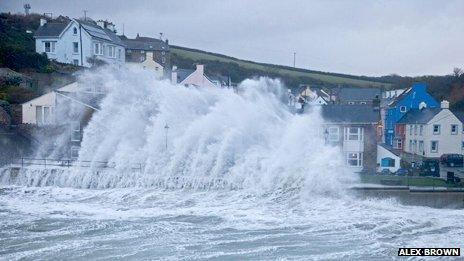
Little Haven, Pembrokeshire, felt the force of the wind and waves
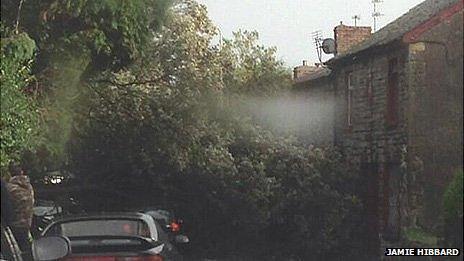
A fallen tree blocked Park Street in Bridgend
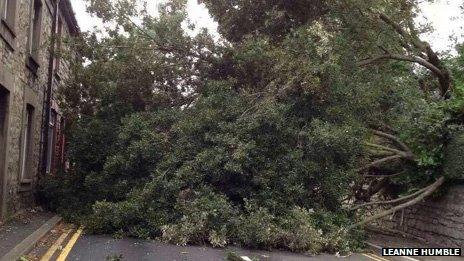
The tree crashed onto a car but the driver managed to free herself and was unharmed
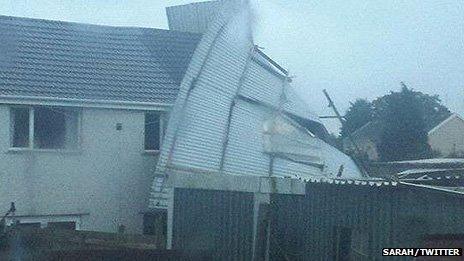
A garage blew onto a house in Beddau near Pontypridd
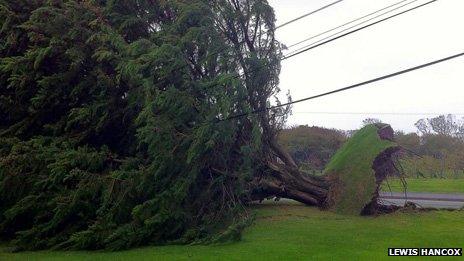
A tree uprooted in Pendine in Carmarthenshire
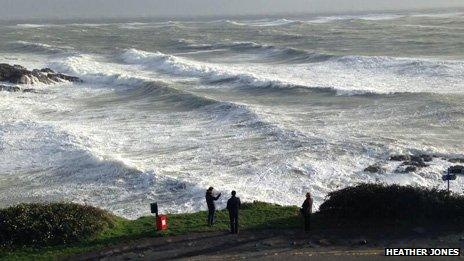
The high sea at Mumbles Head near Swansea, where 89 mph gusts were recorded at 16:00 GMT on Saturday afternoon
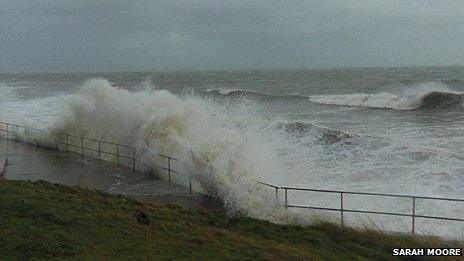
The froth at Amroth - BBC Pembrokeshire reporter Sarah Moore took this photo of the swell on the coast
Engineers have worked through the night to reconnect the majority of homes hit by power cuts during storm-force winds in Wales.
Winds gusting at up to 80mph brought down trees and power lines, causing difficult conditions for drivers.
About 10,000 homes and businesses across south and west Wales lost power at the peak of the high winds.
Natural Resources Wales said nine flood warnings remain in place in coastal areas of the country.
On Saturday, the M4 was closed both ways for two hours between Margam and Pyle after a caravan overturned.
The motorway closure happened after the incident in the contraflow eastbound, causing long delays.
A tree fell onto a car in Park Street in Bridgend but the driver was reportedly unharmed if shaken.
A roof was also blown off a garage onto the house next door at Beddau near Pontypridd, according to South Wales Fire and Rescue.
The roof canopy at the main entrance to the Princess of Wales Hospital in Bridgend was also damaged with one person treated for a minor injury. The entrance has since reopened.
Power failure
The highest wind speed was 89mph recorded at Mumbles head near Swansea at 16:00 GMT.
Artist David Pearce, who lives just outside Swansea, said his daughter's 11ft trampoline was blown across the garden in high winds.
"The roof nearly got torn completely off our shed and our daughter's trampoline took off. It smashed her garden swings and ended up in our hedge," he said.
The old Severn M48 bridge was closed with speed restrictions on the second Severn crossing and Briton Ferry bridges on the M4 and the Britannia bridge over to Anglesey.
In Pembrokeshire, the Cleddau Bridge restrictions were lifted at 19:00 GMT.
Resident Barbara Yorwerth told BBC Wales' Matt Murray how a tree narrowly missed cottages but crashed onto a car, but the female driver managed to escape unharmed.
The Met Office , externalrecorded strong gusts on coasts around Wales from the Bristol Channel to the Llyn Peninsula.
Western Power Distribution, external said that about 10,000 homes and businesses were without power at the peak of the stormy weather. The company covers an area stretching from Chepstow in south east Wales to Pembroke.
As of 21:45 GMT, fewer than 500 remained without power, it said, and it was expected about 100 properties would remain cut off overnight.
Both South Wales and Dyfed-Powys Police have been called to fallen trees blocking roads.
Dyfed-Powys said earlier it had received "a high volume of calls reporting trees down and other damage caused by high winds throughout the force area".
South Wales had received reports of 13 fallen trees in one hour on Saturday afternoon.
'Pretty rough'
Arriva Trains Wales advised passengers not to travel on Saturday evening unless necessary.
Minibuses were running between Rhymney and Bargoed because of poor rail conditions.
There is a yellow [be aware] warning for wind, with a forecast is for heavy, blustery showers with very strong winds continuing overnight. By dawn, winds may start to ease a little inland, with some clear spells in the east.
NRW said with the weather conditions expected to continue into Sunday, combined with the high tides, there could be localised flooding with sea spray and overtopping particularly Pembrokeshire, Ceredigion and the Newport coast.
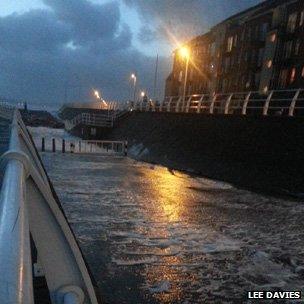
Heavy weather in Port Talbot on Saturday evening
Eleven flood warnings remained in place in coastal areas overnight.
Officers from NRW, external are monitoring sea surge, wind and waves as it could lead to further alerts being issued and possibly tidal flood warnings.
Fallen trees were reported in Bridgend, Cardiff, Llanelli, Swansea. Pembroke, on the A470 northbound at Upper Boat near Pontypridd and on the A48 at St Nicholas in the Vale of Glamorgan.
Fallen power cables also blocked the A4065 Abergarw Road at Bridgend.
Swansea coastguard said it had advised two people to get off the pier at Porthcawl, Bridgend county, due to the waves breaking over it. A coastguard team was at the pier.
A spokesman said: "It's pretty rough down there."
Milford Haven Coastguard said a vessel in the haven recorded a gust of 70 knots (80mph) at around 14:30 GMT.
For the latest on flood alerts and warnings and how you can prepare go to Natural Resources Wales, external or call Floodline 0845 988 1188.
- Published3 November 2013
- Published28 October 2013
- Published28 October 2013